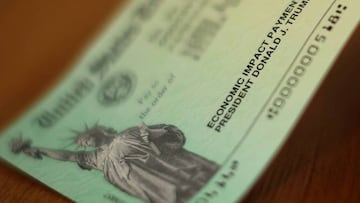Second stimulus check eligibility requirements: what to expect
If and when negotiators reach a deal over the next coronavirus relief package in the U.S., it can be expected to include a second stimulus check for qualifying Americans.

Following last week’s unveiling of the HEALS Act, Republican senators’ $1-trillion proposal for the next piece of coronavirus relief legislation in the United States, talks are ongoing between White House officials and Democratic congressional leaders over the terms of an aid package.
The prospects of the negotiators reaching a deal by Friday's self-imposed deadline look to be slim, but if and when the U.S.'s fifth Covid-19 relief bill finally does go through, it can be expected to include a second round of stimulus checks.
CARES Act gives Americans stimulus checks of up to $1,200
As part of the CARES Act, a $2.2tn relief bill passed in March, qualifying Americans have received checks of up to $1,200 to help them cope with the financial effects of the Covid-19 crisis, which has caused unemployment in the country to soar from pre-pandemic levels of 3.5% to its latest rate of 10.2%.
According to recent research by Columbia University's Center on Poverty and Social Policy, CARES Act measures such as stimulus checks have helped to significantly curb poverty in the U.S. amid the financial crisis. Without the stimulus money, says the CPSP, around 4% more people in the country would have fallen into poverty.
However, an April survey by SimplyWise found that 63% of Americans said they would need a second stimulus check within three months of receiving the first, and the CPSP has warned that “additional income support will be needed” amid continuing high unemployment rates in the States.
With this in mind, the HEALS Act has proposed sending out a second stimulus check.
- Second stimulus check: is a deal possible if not settled by Friday?
- IRS fixes error over $500 credit for dependents
Who was eligible for the CARES Act stimulus checks?
Under the terms of the CARES Act, $1,200 checks have been sent to individuals who earn less than $75,000 a year, while joint tax filers on a combined annual income of under $150,000 have received $2,400. Checks for a steadily smaller amount have also been made available to higher earners, up to a final cap of $99,000 for individuals and $198,000 for joint filers.
In addition, households have been able to claim an extra $500 per dependent under the age of 17.
Who would be eligible for the next round of checks?
By comparing the eligibility requirements of the CARES Act stimulus checks with the conditions set out by Republicans in the HEALS Act and by the Democrats in the HEROES Act - a $3tn proposed stimulus bill that also contained provision for a second check, but was not taken up by GOP senators - the chief conclusion that can be drawn is that the parameters of the next payment will be largely unchanged.
Negotiations over a stimulus bill capable of passing both the Democrat-held House and the Republican-led Senate may be stalling, but this is a result of other issues, such as the extension of expanded unemployment benefits. When it comes to stimulus checks, there appears to be a relatively high degree of bipartisan consensus, as the terms of the CARES, HEROES and HEALS checks are all very similar.
- Stimulus check: CARES vs HEALS vs HEROES Acts
- Stimulus check requirements under Democrats' HEROES Act
- Stimulus check requirements under Republicans' HEALS Act
Income thresholds, credits for dependents
The HEROES Act mirrored the CARES Act by again seeking to give out stimulus checks for $1,200 and $2,400 to individuals on less than $75,000 and joint filers on $150,000, respectively, with the payments phased out up to upper income limits of $99,000 and $198,000. Meanwhile, GOP senators' HEALS Act also agrees that these should be the earnings caps on a second check.
Where a look at the Democrat and Republican stimulus-check proposals also offers fairly clear conclusions over the likely eligibility requirements is the issue of credits for dependents. While the CARES Act sent out an additional $500 only for children below 17, this age limit is absent from both the HEROES Act and the HEALS Act, with all dependents included in the two bills.
According to the Tax Foundation, the removal of the CARES Act age cap would see at least 26 million more people in the U.S. become eligible for the dependents' credit.
Democrats sought $1,200 per dependent
However, one bone of contention could potentially be the amount paid per dependent: while Democrats sought to increase it to $1,200 in the HEROES Act (a sum claimable for a maximum of three dependents), the HEALS Act proposes maintaining the $500 CARES Act figure.
Related stories
The HEROES Act and the HEALS Act also differ on whether or not to include immigrants without a Social Security number, who were left out of the CARES Act checks. Whereas HEROES vowed not only to bring them into the fold but also make them retroactively eligible for the CARES payments, the HEALS Act once more excludes them.
Live coverage of the coronavirus crisis
You can follow the latest U.S. developments in the Covid-19 crisis with our dedicated live blog.

